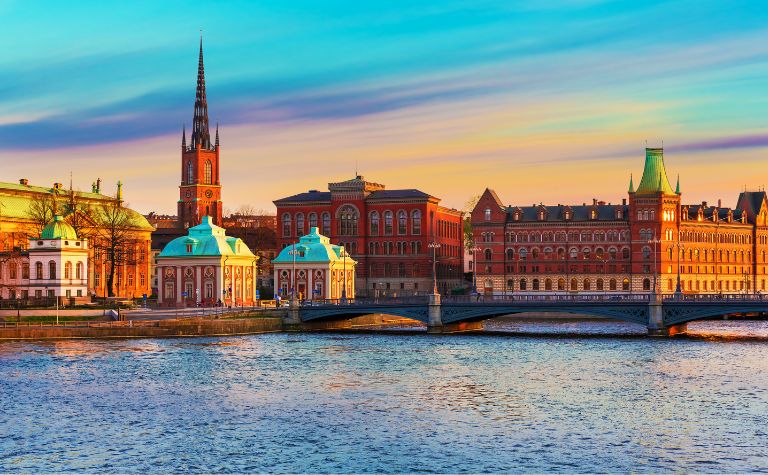A socialist economic setting is where everyone has equal access to the society’s economic output and resources, and the interests of the community come first before individual interests.
Sweden, like other Scandinavian countries, is often considered a prosperous socialist country, but is Sweden really socialist?
Sweden is not socialist. 2015 presidential candidate Bernie Sanders called it “a democratic socialist state.” However, Sweden is a market economy with loose company regulations.
Income taxes are high, and corporate taxes are low, allowing companies to thrive and contribute immensely to the economy.
Before the 60s, the Swedish economic system was essentially capitalist, but from 1960 until the 90s, the country took a turn that most experts believe was a socialist route.
This article looks at the Swedish economic model and debunks whether Sweden is socialist or not.
Also, see Is Denmark a Socialist Country? to learn more.

Why do people think Sweden is socialist?
Many people think Sweden is socialist because Swedes have access to innumerable social benefits.
There’s excellent cooperation between the Swedish government and corporations and labor unions.
The country’s high tax-funded universal social benefits appear more socialist than capitalist. [1]
Sweden, like most of its Nordic neighbors, is a flourishing economy. The country has some of the best incomes for workers, meaning the government collects enough income tax to support its rather ambitious social programs.
Swedish labor unions are powerful and active in negotiating workers’ rights and supporting companies with labor contracts.
Sweden doesn’t maintain minimum wage laws like in the US.
In Sweden, workers are paid what’s worth their input, and consequently, they feel obliged to pay the taxes they owe. In return, the government offers a range of education options to families. [2]
Swedish education is tax-funded and compulsory from age six. [3]
Also, every child in Sweden receives a voucher they use to attend public schools, profit schools, and government-operated charter schools.
Employers have flexible support programs for parents who wish to work.
Companies offer parents generous leave allowances, including other benefits such as parental leave of up to 16 months with 80% of the income payable and a child education plan for up to six months.
Every Swedish citizen has access to universal health coverage. The state aims to bring healthcare prices close to zero.
Unfortunately, this ambitious healthcare structure hasn’t been without its fair share of challenges. Patients have to contend with limited healthcare supplies and resources and long waiting queues.
This is what makes people think Sweden is socialist. But before making such a conclusion, a careful look into Sweden’s tax arrangements would be necessary.
Most economic experts don’t seem to read on the same page regarding Sweden’s economic model.
Swedish Tax System
Sweden’s tax system is somewhat different from others around the world. Although income taxes are high, capital and corporate taxes are low and friendly.
This tax arrangement aims to make the business environment friendly for businesses, preventing them from moving to other countries.
It began in the 90s when Sweden remodeled its economic space to tackle the problems of redistributing more wealth than it was creating. The measures Sweden implemented included: [4]
- Restructuring welfare programs
- Cutting back on government spending
- Reducing corporate regulation
- Reducing the size of the government
Although government taxes remain high, this model has enabled the Swedish economy to grow steadily for the last 24 years.
The country’s fiscal environment has also become an increasingly pro-free market, ranking 15th globally, with the US following closely behind at 18th.
The Swedish tax system is more aggressive than that of the US. Experts interpret it as though the Swedish people are prepaying for their health and social protection programs rather than getting them for free.
Also, see Do Danes and Swedes Hate Each Other? to learn more.

Does Sweden value capitalism?
Sweden values capitalism but redistributes wealth through taxation. Sweden follows a “cuddly” capitalist government model, meaning it’s a capitalist state with heavily funded public services.
However, Sweden doesn’t have minimum wage requirements like most capitalist countries. [5]
Sweden has a more capitalist economic setting than a socialist one. This model came to be along with the Nordic model.
Sweden maintains a highly liberalized capitalist environment that’s more friendly to the community than similar capitalist states, and this is what makes it appear as a socialist setting.
The Swedish social democratic party developed the Swedish capitalist model in 1932, maintaining power until 1976.
Also, see What Is Sweden Known For? to learn more.

Is Sweden a rich or poor country?
Sweden is a rich country, ranking as the world’s 16th wealthiest country. OECD ranks Swedish Gross Domestic Product (GDP) per capita slightly lower than Germany’s.
It’s a high-tech capitalist state with comprehensive social protection programs, and most of its enterprises are privately owned.
GDP per capita is one way to measure a country’s wealth, but that’s not all. All economic status parameters show that Sweden is a relatively wealthy country.
However, not every citizen is rich.
About 7% of Swedish workers still earn below The EU’s at-risk-of-poverty threshold. But 7% is still below the EU’s average of 10%.
Statistics estimate that about 184,000 people in Sweden were in critical material deprivation in 2020. Put differently, these people couldn’t afford essentials like a telephone, car, or house rent.
Although its proportion is the lowest of all other countries, it doesn’t correspond well with a welfare system. [6]
How Sweden Got Rich
Sweden began to turn its fortunes around the mid-19th century after decades of slow economic growth that forced millions to emigrate to North America.
During the industrial revolution, Sweden enjoyed vast iron ore and wood reserves in high demand in Germany and Britain.
The country’s relative peace for more than 200 years is something else to thank for the immense Swedish wealth.
It’s worth noting that Sweden hasn’t participated in war since 1814.
Also, as European economies struggled to rebuild post World War II, the Swedish economy wasn’t destroyed, giving Sweden an advantage ahead of other countries like Germany that were almost destroyed.
Conclusion
Sweden is a capitalist state with extensive social welfare arrangements that often make people think it’s a socialist state.
Also, see How to Move to Sweden to learn more.
